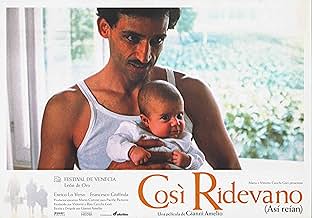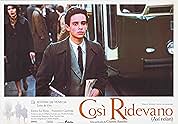Agrega una trama en tu idiomaTurin at the end of the fifties: two brothers have emigrated there from Sicily and the older works very hard to let the younger study and free himself from poverty through culture. The boy h... Leer todoTurin at the end of the fifties: two brothers have emigrated there from Sicily and the older works very hard to let the younger study and free himself from poverty through culture. The boy however is not keen on school and would like to begin to work. When after some time he gets... Leer todoTurin at the end of the fifties: two brothers have emigrated there from Sicily and the older works very hard to let the younger study and free himself from poverty through culture. The boy however is not keen on school and would like to begin to work. When after some time he gets his degree however things take a violent and dramatic turn......
- Dirección
- Guionistas
- Elenco
- Premios
- 9 premios ganados y 14 nominaciones en total
- Dirección
- Guionistas
- Todo el elenco y el equipo
- Producción, taquilla y más en IMDbPro
Opiniones destacadas
"Così Ridevano" is a human movie about the relationship between brothers, and characters and fraternal sacrifices. The story is developed from 1958 to 1964, showing the economical situation of Italy, more specifically of Turin, and how the Southern immigrants from Sicily were treated and explored by their employers. It is touching to see how Giovanni respects the books and sees the importance of education contrasting in a counterpoint with the feelings of his reckless brother. The screenplay is divided in six chapters ("arrivals", "deceptions", "money", "letters", "blood" and "families") and uses ellipsis, jumping through the years and leaving many situations unresolved as if they were kept in secret. The storyline has many points in common with Luchino Visconti's masterpiece "Rocco e i Suoi Fratelli" (Italy in early 60's, the fight for survival of a family from the countryside in Milano and the relationship among brothers). However, the plot is never corny and the conclusion is totally unexpected and unpredictable. My vote is eight.
Title (Brazil): "Assim É Que Se Ria" ("That's the Way We Laughed")
The title, referring to an old joke column, is ironic. The film's review of Italian post-war economic miracle years is deeply tinged with sadness and a sense of the price paid in innocence lost to gain security and status. The whole focus is on the love between two Sicilian brothers, Giovanni and Pietro. The angel-faced Pietro (Francesco Giuffrida) from the first appears devious. When his brother arrives at the station, he slinks off and hides from him. He's lazy, a dandy, a liar, a faker, a bad seed. Yet he's worshiped by the innocent, muscular, illiterate Giovanni (Enrico Lo Verso), who has turned up with other southern immigrants at the Turin railway station intending just to visit his baby brother as the film opens and then stays on in the North to support him.
The mise-en-scène is visually beautiful but conventionalizes the period into a kind of grimy poetry more worthy of twenty or thirty years earlier, no doubt consciously echoing Italian neorealist films (Amelio has been called the new De Sica) or becoming a glossier color version of Visconti's mournful epic tragedy of southern Italians in Milan, "Rocco and His Brothers" (1960). My DVD's Italian jacket copy translates a paragraph from Stephen Holden's 2001 NYTimes review expanding one of its key ideas: "'Così rideveno'has the power to keep its own secrets," this Italian version reads. "Without ever being moralistic, by the end it becomes the metaphor for a whole society that makes a kind of tacit pact with itself never to look too deeply into the hidden effects social processes have on individuals and their destinies." The interest -- and yet the frustration -- of the film is that its sequences each appear revelatory, but shed little light on the intervening periods of time. It is organized in a "rather elegant" manner (Rosenbaum) into a structure of microscopic views of single days out of each year from 1959 through 1964, each day designated by a key word: "arrivals," "deceptions," "money", "letters, "blood," and "families." This neat structure masks a surrounding mystery in the relationship between the two brothers, and we deduce for ourselves from the way they seek out and avoid each other how alike and interdependent they are. Each cherishes illusions about the other; one is proud, the other ashamed. Vivid and touching as the film is, it's also highly artificial, notably in how little of the two characters' lives is made clear, how little the world outside their relationship is explored.
Metaphorical indeed, "Così ridevano" explores an inseparable (and ultimately false) dichotomy between innocence and experience, naiveté and sophistication that may go to the heart not only of North-South relations but of the Italian soul. Both actors, Amelio regular Lo Verso and newcomer Giuffreda, are remarkable, and the scenes between them are heartbreaking.
So far the only other Amelio film I've seen is "The Housekeys" ("Le chiavi di casa," 2004), which being a documentary-like chronicle of a short stretch of contemporary time, seems so different, and yet on reflection is so similar in feeling. Obviously Amelio is an extraordinary director and I must see "Lamarica" and "Stolen Children" ("Il ladro di bambini"), both also starring the intense, soulful Lo Verso, which have received the highest praise of any of Amelio's films.
It shows one day in their life each year between 1958 and 1964, avoiding movie convention by not filling in the details of what's gone on during the time in between. It's left to us to figure out, or imagine.
While brave and challenging, the characters never fully develop, sometimes feeling more sketchy and symbolic than full blooded.
Early on I thought I might be watching a masterpiece, but as it went on, I felt (to quote Chicago Reader critic Jonathan Rosenberg) 'guilty for not liking it more'. Still, a strong and original enough film that I'd like to revisit it one day, and see if it grows even deeper on 2nd viewing.
The film is separated into six parts labeled "Arrivals," "Deceptions," "Money," "Letters," "Blood" and "Families", each taking place on one day during the period from 1958 to 1964. While this technique allows us to understand the events taking place in Italy during this period, the sudden changes in the lives of the characters is difficult to follow and we are left having to put the pieces of the puzzle together on our own. As the film opens, Giovanni (Enrico Lo Verso), a poor illiterate worker arrives from Sicily to visit his teenage brother Pietro (Francesco Giuffrida) in the industrial north of Italy who is studying to become a teacher. Determined that his brother Pietro will get a good education, he decides to remain in Turin to support him.
It is clear from the outset that all is not well with Pietro. He hides behind a pillar at the train station rather than meeting his brother, then goes out of way to help a Sicilan family who are lost until he finally gives up in disgust. He is very handsome but there is a haunted look in his eyes and it is never clear what his secrets are. Giovanni, magnificently portrayed by Lo Verso, is quite different. He is a giving person -- open and warm hearted. He sacrifices for Pietro, working low paying menial jobs but the younger brother seems unmotivated and does not take studying very seriously. Their love is not at issue, but each has an idealized picture of the other and they never fully come to grips with each other's reality.
As the years go by, Giovanni begins to move up the economic ladder and becomes a low-level Supervisor, then the boss of a cooperative. Pietro meanwhile has gone to a private teacher and has received his degree. The brothers remain close but when Pietro witnesses Giovanni getting into a fight with a presumed underworld figure, the consequences that result from self-sacrifice and the betrayal of morality are explored in a powerful conclusion. Like Giovanni's rise to a position of power through suggested shady dealings, The Way We Laughed seems to be saying that as modern Western societies have become rich, they have arrogantly forgotten the values it took them to get there.
The Way We Laughed is loaded with exciting Italian locales, flirts briefly with political movements, but the focus is always on what's going to happen to the relationship of these very different men. In no way a cheerer-upper, and not exciting in any conventional way, the performances are superb and the narrative compellingly mysterious if the viewer has the patience for scenes that attempt to accurately capture the process of decision making, to the way relationships often work.
¿Sabías que…?
- TriviaThe title refers to the back page of a popular 1950s Italian magazine which had a section devoted to old jokes that were no longer funny but still evoked a sense of nostalgia. One such joke is repeated throughout the film: "How do you get four elephants in a Fiat?" The answer: "Two in front and two in back".
- ConexionesReferenced in Cannes Paradise (1999)
- Bandas sonorasCucara cha cha cha
Written by Tony Vargas and Pepe Villa
Performed by Dámaso Pérez Prado
Courtesy of Peer International Corp./Edizioni Peersongs Italy Srl
Selecciones populares
Detalles
Taquilla
- Total en EE. UU. y Canadá
- USD 57,009
- Total a nivel mundial
- USD 57,009
Contribuir a esta página






















